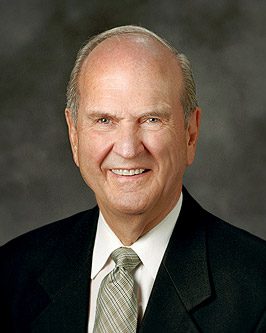
If you’re an anti-vaxxer in general or someone who just refuses to receive vaccination against the COVID-19 pandemic in particular, you plainly won’t find much support for your position among the senior leadership of the Church of Jesus Christ of Latter-day Saints:
Here’s an official statement from the Church, issued today, Tuesday, 19 January 2021:
In word and deed, The Church of Jesus Christ of Latter-day Saints has supported vaccinations for generations. As a prominent component of our humanitarian efforts, the Church has funded, distributed and administered life-saving vaccines throughout the world. Vaccinations have helped curb or eliminate devastating communicable diseases, such as polio, diphtheria, tetanus, smallpox and measles. Vaccinations administered by competent medical professionals protect health and preserve life.
As this pandemic spread across the world, the Church immediately canceled meetings, closed temples, and restricted other activities because of our desire to be good global citizens and do our part to fight the pandemic.
Now, COVID-19 vaccines that many have worked, prayed, and fasted for are being developed, and some are being provided. Under the guidelines issued by local health officials, vaccinations were first offered to health care workers, first responders, and other high-priority recipients. Because of their age, Senior Church leaders over 70 now welcome the opportunity to be vaccinated.
As appropriate opportunities become available, the Church urges its members, employees and missionaries to be good global citizens and help quell the pandemic by safeguarding themselves and others through immunization. Individuals are responsible to make their own decisions about vaccination. In making that determination, we recommend that, where possible, they counsel with a competent medical professional about their personal circumstances and needs.
***
I want, again, to call your attention to some of the early articles published in Interpreter: A Journal of Latter-day Saint Faith and Scholarship. They’re still valuable, of course, and worthy of continued attention:
Noel B. Reynolds, “Rethinking the Apostle Peter’s Role in the Early Church”
Royal Skousen, “Why was one sixth of the 1830 Book of Mormon set from the original manuscript?”
Abstract: Evidence from the manuscripts of the Book of Mormon (as well as internal evidence within the Book of Mormon itself) shows that for one sixth of the text, from Helaman 13:17 to the end of Mormon, the 1830 edition of the Book of Mormon was set from the original (dictated) manuscript rather than from the printer’s manuscript. For five-sixths of the text, the 1830 edition was set from the printer’s manuscript, the copy prepared specifically for the 1830 typesetter to use as his copytext. In 1990, when the use of the original manuscript as copytext was first discovered, it was assumed that the scribes for the printer’s manuscript had fallen behind in their copywork, which had then forced them to take in the original manuscript to the 1830 typesetter. Historical evidence now argues, to the contrary, that the reason for the switch was the need to take the printer’s manuscript to Canada in February 1830 in order to secure the copyright of the Book of Mormon within the British realm. During the month or so that Oliver Cowdery and others were on their trip to nearby Canada with the printer’s manuscript, the 1830 typesetter used the original manuscript to set the type, although he himself was unaware that there had been a temporary switch in the manuscripts.
Stephen O. Smoot, “Shaken Faith Syndrome and the Case for Faith”
Abstract: Michael R. Ash is a Mormon apologist who has written two thoughtful books and a number of insightful articles exploring a wide range of controversial issues within Mormonism. His recent book Shaken Faith Syndrome: Strengthening One’s Testimony in the Face of Criticism and Doubt is an outstanding apologetic resource for individuals searching for faith-promoting answers that directly confront anti-Mormon allegations and criticisms. Ash does an excellent job in both succinctly explaining many of the criticisms leveled against The Church of Jesus Christ of Latter-day Saints and articulating compelling answers to these criticisms.
Review of Michael R. Ash. Shaken Faith Syndrome: Strengthening One’s Testimony in the Face of Criticism and Doubt. Redding, CA: Foundation for Apologetic Information and Research, 2008. x + 301 pp., with index. $19.95 (paperback).
Louis C. Midgley, “Defending the King and His Kingdom”
Again, if the trumpet does not sound a clear call, who will get ready for battle?
1 Corinthians 14:8 NIV
Abstract: Some vocal cultural Mormons, busy asking themselves “why stay,” claim that it is not at all probable that there is a God, or that there even was a Jesus of Nazareth. They also ridicule the Atonement. In the language of our scriptures they are antichrists—that is, they deny that there was or is a Christ. Being thus against the King and His Kingdom, their trumpet does not give a clear sound; they are clearly against the one whom they made a solemn covenant to defend and sustain. Instead of seeking diligently to become genuine Holy Ones or Saints, they worship an idol—they have turned from the Way by fashioning an idol. They preach and practice a petty idolatry. Genuine Saints, including disciple-scholars, have a duty to defend the King and His Kingdom.
John Gee, “The Apocryphal Acts of Jesus”
Abstract: Numerous noncanonical accounts of Jesus’s deeds exist. While some Latter-day Saints would like to find plain and precious things in the apocryphal accounts, few are to be found. Three types of accounts deal with Jesus as a child, his mortal ministry, or after his resurrection. The Jesus of the infancy gospels does not act like the Jesus of the real gospels. The apocryphal accounts of Jesus’s ministry usually push a particular theological agenda. The accounts of Jesus’s post-resurrection teaching often contain intriguing but bizarre information. On the whole, apocryphal accounts of Jesus’s ministry probably contain less useful information for Latter-day Saints than they might expect.
And these are just a few of the hundreds of articles that the Interpreter Foundation has published since it was established in the second half of 2012.












